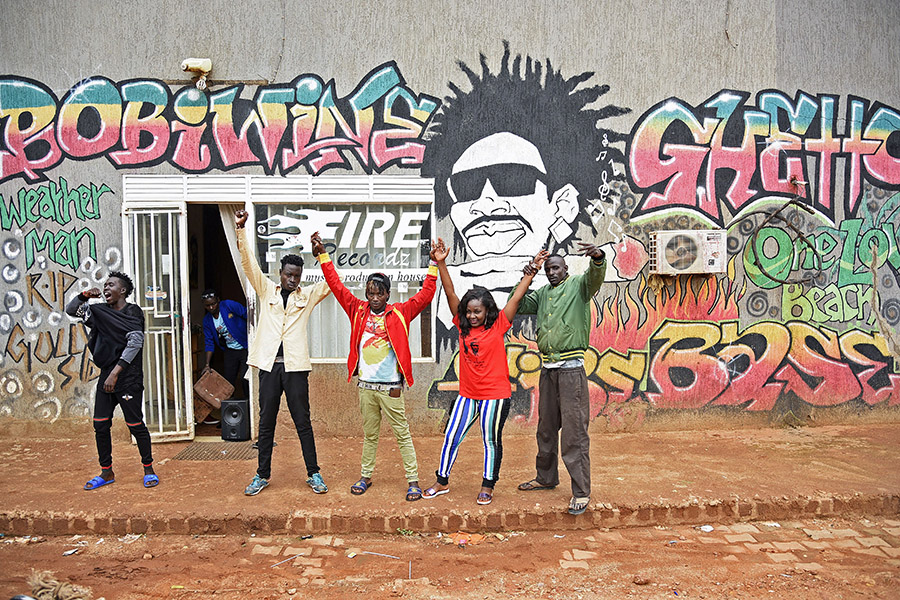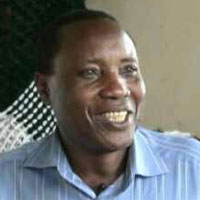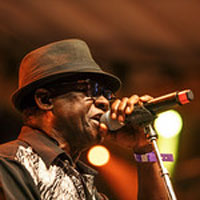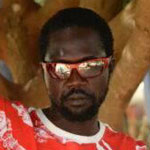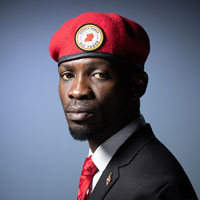Bobi Wine believes he was supposed to be a dead man.
The Ugandan musician-turned-politician Robert Kyagulanyi Ssentamu—popularly known as Bobi Wine—was campaigning for an opposition candidate in northwest Uganda when his driver Yasin Kawuma was shot dead in their vehicle on August 13, 2018.
“My driver was shot dead and the target was me,” Bobi Wine said, alleging that police shot and killed Kawuma.
This tragedy was one of several that weigh on the activists participating in Bobi Wine’s movement for political change in Uganda, united by the slogan “People Power, Our Power.” They risk abductions, torture, and even death to organize against the government of Yoweri Museveni, whose 33-year presidency has grown steadily more repressive and authoritarian.
“So much happened to the people, and I believe that the whole intention is to create so much fear,” Bobi Wine said. “So, there’s fear out there.”
Facing violence in the streets, censorship, and close tracking by military personnel, Bobi Wine’s movement, called People Power, has nonetheless gained widespread support from Uganda’s urban youth. While Bobi Wine’s music and the energy of his personality are driving forces in his movement, People Power may struggle to effect lasting change in Uganda unless it can transcend its charismatic leader.
The Man Behind the Message
Despite the looming odds against him, Bobi Wine is a growing international phenomenon. Before entering politics, Bobi Wine had an eminent career in the entertainment world, particularly as one of Uganda’s most successful Afrobeats artists.
Through many of his songs, Bobi Wine openly vocalized his dissent with Museveni. After years of expressing his message through music, Bobi Wine decided to bring about the change he wanted to see in Uganda by running for office himself. He won a parliamentary seat by a landslide victory in 2016, a significant feat in a country where the deck is stacked against opposition candidates. Now, he plans to challenge Museveni in the 2021 presidential election.
Bobi Wine is just one of many leaders in Africa and beyond who blurs the line between entertainment and politics.
Liberian politician George Weah was formerly the soccer World Player of the Year in 1995. Ukraine President Volodymyr Zelensky was a comedian who starred in Servant of the People before taking office. Additionally, U.S. President Donald Trump had a career in real estate and reality television before his election.
“Figures like Bobi Wine are not unique to Uganda but are actually part of a larger trend across Africa of young, popular musicians who are espousing very political ideas,” Vassar College Africana Studies Director Zachariah Mampilly said. “I think that is something that has defined Uganda for a long time.”
Bobi Wine’s music and message are geared toward the growing population of young people in Uganda’s urban centers. These areas pose a demographic challenge for Museveni and an unmatched opportunity for opposition politicians like Bobi Wine.
Young, Connected, and Mobilized
With one of the world’s youngest populations—over 78 percent of Ugandans are younger than 30— Uganda is a prime example of how a youth bulge can transform politics. A youth bulge, as defined by academic Sohail Inayatullah, refers to a demographic pattern where a large share of the population is comprised of children and young adults.
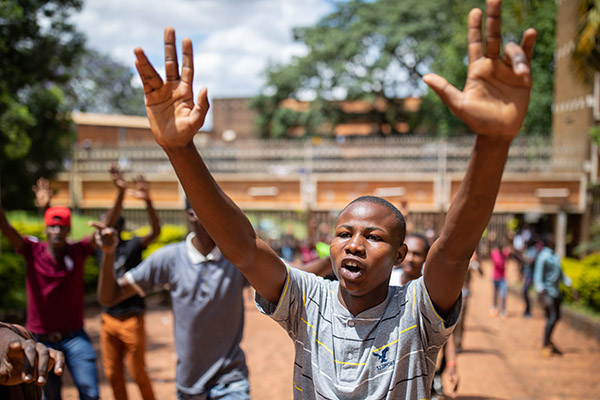
According to a Population Action International study, there is a strong correlation between countries prone to civil conflicts and those with rapid expansions of their youth population.
Johnnie Carson—former U.S. ambassador to several African countries, including Uganda—said he thinks Museveni has made political decisions with the youth bulge in mind.
“I think he has tried to step up his efforts to create an economic environment that would attract foreign investment, create manufacturing jobs, and provide positive alternatives for Uganda’s youth,” Carson said.
Despite these efforts, Uganda’s youth unemployment rate is among the highest in the region, with recent estimates putting it at over 13 percent. This trend is worse in urban areas, where Bobi Wine’s message especially resonates with young people worried about a lack of prospects.
Despite these economic difficulties, Uganda’s urban population grew at a rate of 5.6 percent between 2002 and 2010—twice as fast as rural areas. While the internet and social media have not fully penetrated Uganda’s rural areas, Maria Burnett, formerly of Human Rights Watch, said, “for youth around the capital and in some large towns, it’s a fantastic tool for spreading messages.”
All of these factors have contributed to the rise of the People Power movement, which represents perhaps the most significant challenge to Museveni’s presidency.
A New Threat
Bobi Wine sets himself apart from Museveni in many ways, but particularly in how he connects with youth. These youth are critical to the People Power movement, representing the resistance against the country’s long-standing political elite that fuels Bobi Wine’s revolution.
Before Bobi Wine, other opposition leaders have challenged Museveni and sought support for a presidential bid. Ugandan physician Kizza Besigye has attempted for many years to challenge Museveni and has faced harassment and violence from the government as a result. But the 63-year-old Besigye, who comes from the same generation as Museveni, has also struggled to mobilize the growing base of young, urban voters.
“Bobi is very different—comes out of the urban areas, has this message, and this platform through his music—and so he’s able to galvanize people in ways that a traditional opposition has not,” said Judd Devermont, director of the Africa Program at the Center for Strategic and International Studies.
Museveni’s age will prove to be one of his greatest obstacles to connecting with a broader population. He became the president of Uganda in 1986 and still relies on the sympathies of those who remember his hero narrative. However, two-thirds of Ugandans were not alive when Museveni was fighting in the Ugandan Bush War (1980-1986).
Museveni has tried to retell his story to the younger generation—in 2018, his daughter directed a film glorifying his role in the war. But many Ugandan youths have found a message in Bobi Wine’s music that resonates more vividly than Museveni’s heroic tales of a war most have only read about in history books.
“Music is the Weapon of the People”
Bobi Wine is a prime example of trying to spark political change by connecting with a younger population through music. He has used music to send politically charged messages throughout the country.
Music is a way to motivate Ugandans—mostly the younger generation—to engage in politics when they may have otherwise remained bystanders. Protest songs are a unique tool musicians use to motivate others to fight injustice.
“In places like Uganda, [politics] can be threatening. If you choose to go out onto the streets and protest you could be arrested, you could be tortured, you could be killed,” Mampilly said. “Artists are able to mobilize populations using a different type of logic. If you are moved by a protest song, if you are moved by a piece of political art, you’re often choosing to engage with something in a way that is different than how you might do it in terms of an individual calculus.”
As far as Africa is concerned, music cannot be for enjoyment, it has to be for revolution.
Fela Kuti, Nigerian musician
Bobi Wine is not the first individual to use music to spread political messages, but he is one of few who has used his popularity to run for political office. He benefits as a candidate because of the correlation between the ages of People Power movement supporters and the general fanbase of hip-hop music.
“Hip-hop artists have responded by really speaking to their political and economic conditions in ways that made Bobi Wine almost an inevitable outcome,” Devermont said.
“Mutessa Balaba Taliwo Buganda”
“Time Bomb”
Aware of the popularity of music among young people, Museveni has sought to appeal to youth by recruiting musicians who are similar to Wine to support his agenda, reaching an untapped audience of potential young voters.
Among the president’s supporters is hip-hop artist Bebe Cool, who has started a politically oriented group, the Silent Majority. He believes that despite the media attention the Power People movement receives, its members are a minority of voters.
In December 2018, police forces shut down Bobi Wine’s Boxing Day concert, while Museveni endorsed Bebe Cool’s concert on the same day. Bobi Wine alleged police raided his personal property, stopped concert preparations, and arrested some of his staff.
Threatened by Bobi Wine’s growing popularity, Museveni is using physical intimidation to quiet opponents in an effort to stifle the power of his music, but Bobi Wine continues to deliver his revolutionary calls.
Kicking Criticism to the Curb
Museveni’s methods of silencing critics challenge political rivals’ efforts to mobilize opposition, though his tactic of physically intimidating opponents is not new to his regime.
For example, police allegedly shot Besigye in the hand during his 2011 arrest. Most recently, Besigye was on his way to address supporters when police blocked his entry and used water cannons to force him from his vehicle.
Burnett argues that physical intimidation by the police often has a chilling effect on political protests.
“It also makes people question whether or not they should speak up or go out into the streets in the future,” she said.
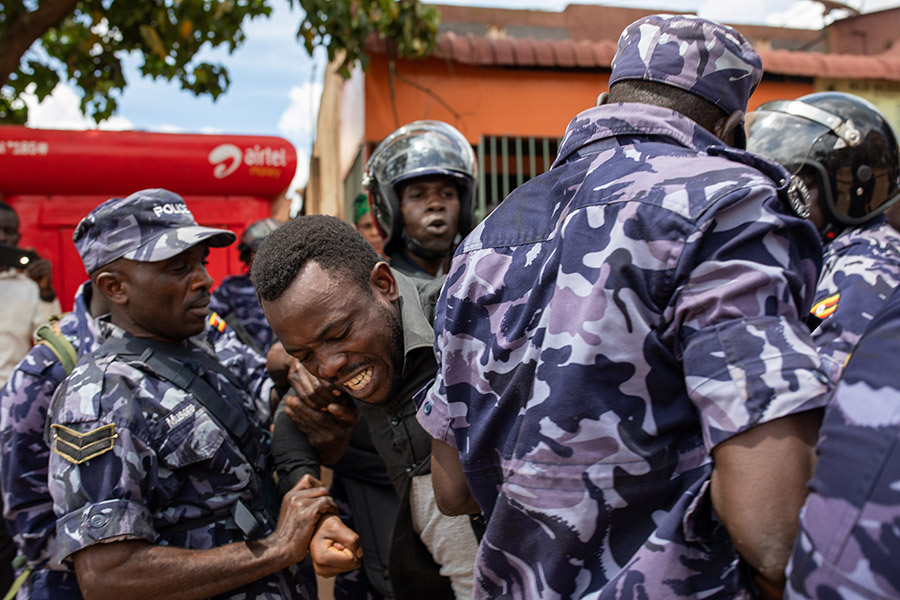
On the other hand, Mampilly said using brutality to quiet opposition can stoke division between the government and its people.
“Every time the regime kills a popular musician or every time the regime sends tanks out into the streets, it’s actually feeding into the narrative of the movement itself, which is wielding the symbols of authoritarianism in order to mobilize the population against the Museveni regime,” he said.
In the summer of 2019, Ziggy Wine—Bobi Wine’s close friend and supporter of the People Power movement—was abducted, tortured, and later died as a result of the injuries he sustained. Bobi Wine and his supporters allege this was politically motivated, prompting the musician’s vow on Twitter to end the violence.
Beyond the use of brute force, the Museveni government has leveraged its legal system to put political opponents like Wine in constant jeopardy, charging the presidential hopeful with treason and “annoying” the president. The government’s close watch over Bobi Wine has challenged his ability to organize his supporters, creating obstacles to running a successful campaign.
“Freedom” and Censorship
Another strategy Museveni’s regime uses to quiet opposition is censorship. Bobi Wine’s music is censored, his concerts are banned, and his rallies are shut down, all limiting his ability to spread his political message.
Bobi Wine’s song “Freedom,” which directly critiques Museveni, has been banned in Uganda. But the musician said he has found ways to work around the censorship.
“We are glad we have social media, which has really picked up, although President Museveni and his government impose the [social media] tax . . . still people of Uganda go around social media,” he said.
Museveni imposed this widely unpopular social media tax in 2019. Ostensibly created to combat gossip, the tax also represented a crackdown on a popular means of communication for Museveni’s political opponents. While some Ugandans have paid the tax and others have found ways to evade it, use of the internet in Uganda dropped significantly after its adoption.
Still, censorship of Bobi Wine’s music remains one of his greatest challenges—as one individual, Bobi Wine is a vulnerable target for a repressive government. Without rallies, he will struggle to raise sufficient funds or spread his message to a wider audience.
Building a Sustainable Movement
The future of Bobi Wine’s presidential aspirations remains up in the air, but some recent uprisings in the region shed light on how more decentralized movements promote lasting political change.
Mampilly pointed to movements that adopt a structure that does not emphasize a single leader’s role. Other countries, such as Senegal and Sudan, have successfully transitioned into the post-revolutionary phase because of the grassroots power of their movements.
We believe that we should empower institutions and not another strongman.
Bobi Wine
In Senegal, the movement called Y’en A Marre—which translates to “Fed Up” in French—emerged in 2011 around then-President Abdoulaye Wade’s attempt to run for a third term, in violation of the constitution. This group of musicians and journalists united to mobilize masses of young people to protest, ultimately playing a key role in ousting the president and stopping his efforts to amend the constitution.
When Macky Sall came into power as the new president, he reached out to Y’en a Marre leaders about taking on government roles, but they refrained from joining his party.
“The Y’en a Marre and other groups like Lucha in the Democratic Republic of Congo have recognized that their role is not simply to take the first offer to join the government, but rather to retain a space for social movements, for civil society, because that is actually the best measure for the health of democracy itself.”
The decision that movements have to make, Mampilly said, is whether to adopt a more decentralized structure to maintain distance from the government and thus bolster their resilience to repression. The other uprisings in the region were successful, he said, because those involved did not connect the movement’s structure to a single individual as a source of inspiration.
“Either the leader of the movement is co-opted by the government or they are repressed by the government,” he said. “The movement has to be able to survive beyond any single individual.”
Mobilizing the Masses
While Bobi Wine says he looks to structure his movement to thrive beyond his leadership, the People Power movement will likely grapple with the potential pitfalls of vying to win elections. These risks do not affect social movements that eschew power.
Groups such as Y’en a Marre which intentionally shy away from joining the government remain forces of resistance to hold political leaders accountable. Conversely, the People Power movement emerged to not only spark political change but to elect Bobi Wine as Uganda’s next president.
Even if the People Power movement does not successfully land Bobi Wine in Uganda’s highest political office, Devermont said, Ugandans will be more prepared to mobilize against government repression in the future.
“It may be a couple of years before we see a figure like Bobi Wine, and maybe we won’t see a specific individual, but more of a mass movement,” Devermont said. “I believe that President Museveni will continue to face these kinds of challenges as he holds onto power. As the country continues to restrict freedom of speech and restrict political pluralism, we will see more people on the street.”
